Stranded and alone in Mexico, deportees miss the country they call home
NOGALES, Mexico — Recent immigration raids and highly publicized deportations following President Trump’s executive orders on border security and immigration enforcement are putting a spotlight on a segment of society that’s long lived in the shadows.
But what happens to “the undocumented” once they’ve become “the deported”? Seventy miles south of Tucson and mere steps from the United States border in Nogales, Sonora, a loosely connected community of deportees struggles to survive as strangers in a country that is legally their own but feels nothing like home.
Once a popular destination for day trips or weekend getaways among families and college students from Tucson, Nogales saw traditional tourism dry up following a spate of violence by warring drug cartels in 2008 and 2009. These days, the city is mostly frequented by so-called medical tourists, older, often retired, U.S. citizens who pour across the border from Arizona daily in search of discounted dental services and prescription refills.
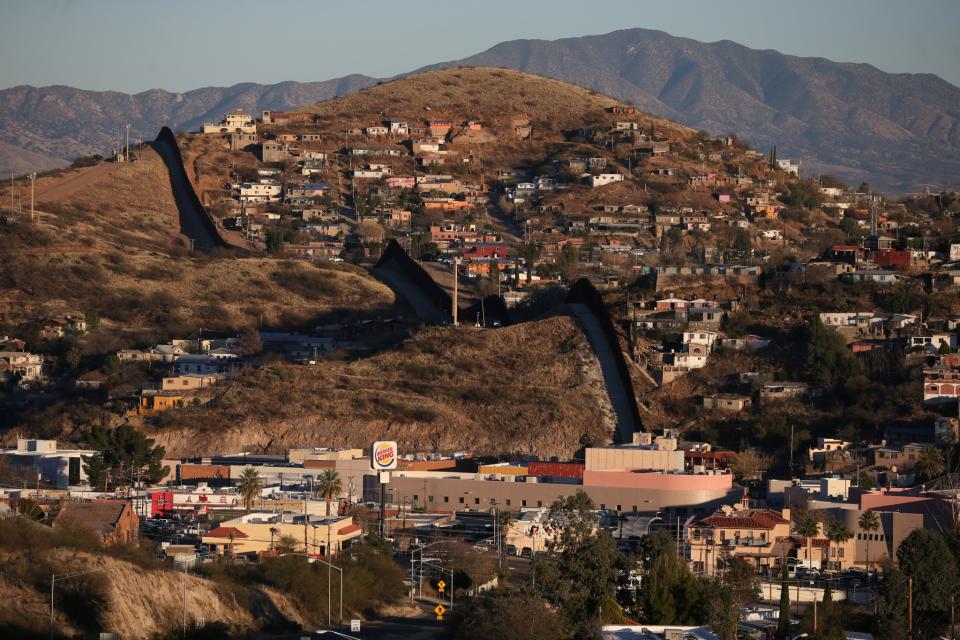
Nogales is also the primary dumping ground for native-born Mexicans deported from Arizona. In 2016 alone, the U.S. deported 22,934 Mexican nationals to Nogales, according to Mexico’s National Institute for Migration.
For many immigrants who grew up in the U.S., life after deportation is like living in perpetual purgatory. Rejected by the country they consider home and exiled to a foreign land to which they have little or no personal connection, many describe feeling unwelcome in Mexico and unable to relate to other Mexicans.
Lonely and afraid, few dare venture into the interior of the country, choosing instead to remain near the border and their family on the other side. Simply being in close proximity to the United States also seems to provide some comfort, even if it’s from behind a 15-foot-tall sheet of rust-colored steel rods.
“Banishment was something from medieval times,” said Tobin Hansen, a doctoral candidate in cultural anthropology at the University of Oregon who currently lives in Nogales, where he researches the effects of deportation on long-term U.S. residents. “It would be thought to be inhumane that U.S. citizens or native-born people would be banished.”
Through his research, Hansen said, he aims to reorient people’s thinking about the concept of deservingness, or “who belongs and who doesn’t.” Nationality, he argues, should take into account connections to place and culture, such as relationships with other people, rather than just “the happenstance of where your mother was when you were born.”
Arizona’s historically hard-line approach to detention and deportation has been a test of the sweeping immigration enforcement policies being implemented by the Trump administration. Many of the state’s undocumented residents have already been branded with criminal charges for nonviolent, often immigration-related crimes, making them vulnerable to deportation under new Trump administration orders that now cover not just violent criminals but almost everyone in the United States illegally.
Yahoo News traveled to Nogales to hear from others who, after decades in the U.S., are now struggling to adjust to life south of the border. Like Guadalupe Garcia de Rayos, a Phoenix mother of two who was deported to Nogales after more than 20 years in the U.S. because of a fake-ID charge from 2008, all of the people we spoke to were deported following a run-in with local law enforcement in Arizona, most of them incurring minor charges for which they are now paying a heavy price.
_____
Adrian Quiroz
Adrian Quiroz was 11 or 12 years old when his family moved to the U.S. from Mexico City. Unlike most migrant families, Quiroz’s parents weren’t driven by poverty, but economic success. His parents ran a profitable toy business, Quiroz recalls, and one day someone tried to kidnap his younger brother. That’s when they decided to move.
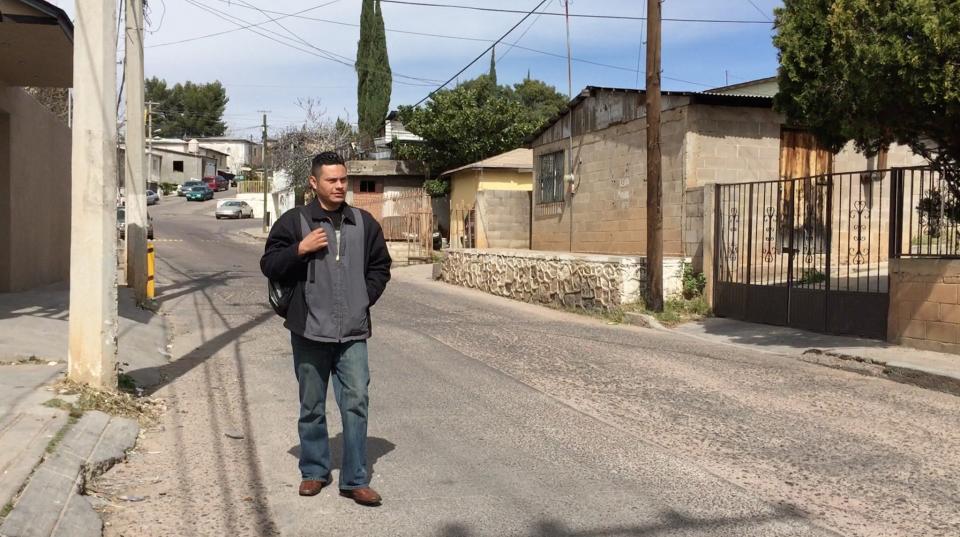
Quiroz spent the next 17 years in Mesa, Ariz., where he went to public schools and briefly studied graphic design at Mesa Community College before starting his own landscaping company. He enjoyed playing beer pong with his friends and practicing songs by Sublime and the Red Hot Chili Peppers on his guitar. He was engaged to the mother of his first-born child, and they were expecting another.
“I had the American dream,” said Quiroz, now 29. That lasted, he said, until July 2, 2015. “I remember that day like it was yesterday.”
According to Quiroz, he was driving with his son, Adrian, when he spotted his fiancée’s brother who, Quiroz says, was supplying his fiancée with drugs.
Angry and concerned for the health of his unborn child, Quiroz says he pulled over and began fighting with his would-be brother-in-law. His fiancée arrived, and in the melee, he accidentally hit her with his truck. He called the police, but ended up in handcuffs himself, charged with aggravated assault and child endangerment.
In the immediate aftermath, Quiroz said his father came to pick up Adrian. But because he hadn’t signed over custody to his father in advance, Adrian was eventually taken into custody of the Arizona Department of Child Safety (DCS) and placed in a foster home. He was joined by his baby brother, Aiden, as soon as he was born.
“They are together, thank God,” said Quiroz. But that’s not enough. Since that day, Quiroz has been fighting an uphill battle to be reunited with his kids.

After six months in Maricopa County’s notorious Tent City jail, Quiroz accepted a plea deal for a reduced domestic violence charge in exchange for time served and two years probation — a move he thought would help speed up the process of being reunited with his children. In reality, it only moved him closer to deportation.
As soon as he was released from Maricopa County’s custody, Quiroz says, he was picked up by agents of U.S. Immigration and Customs Enforcement, or ICE, and placed in immigration detention. After about four months, Quiroz received another letter from DCS, this time warning him that more than a year behind bars would result in the automatic loss of his parental rights.
Once again, Quiroz sought a deal from the judge, but this time the only option for release was through deportation. Desperate to be released before losing his kids for good, Quiroz agreed and, in April 2016, he was deported to Nogales. His mind swirling with anxiety about his children, he spent his first night in Mexico outdoors in a park.
When he returned to the Mexican Immigration office the next morning, they told him, “We’ve been looking for you. We had a shelter to take you to and food to give you.”
Quiroz was taken for his first breakfast at the Comedor, a soup kitchen for recent deportees run by the Kino Border Initiative (KBI), a binational Catholic services organization. That night he slept inside at the family run San Juan Bosco immigrant shelter, where he says was allowed to stay for longer than the three nights usually allotted to recent deportees. He credits KBI and the shelter with helping him get a job, and giving him the hope he needed to continue his custody fight.
Two weeks after he was deported, Quiroz landed his first job in Mexico — making garage door openers for Chamberlain, one of several American manufacturing companies, including General Electric and Walbro, with factories in Nogales. He got himself an apartment and he began making calls to DCS in Arizona.
“I’m going to find my kids,” he vowed. “I’m going 110 percent to do it. I’m going to have my kids.”
Nearly one year later, he’s still fighting.
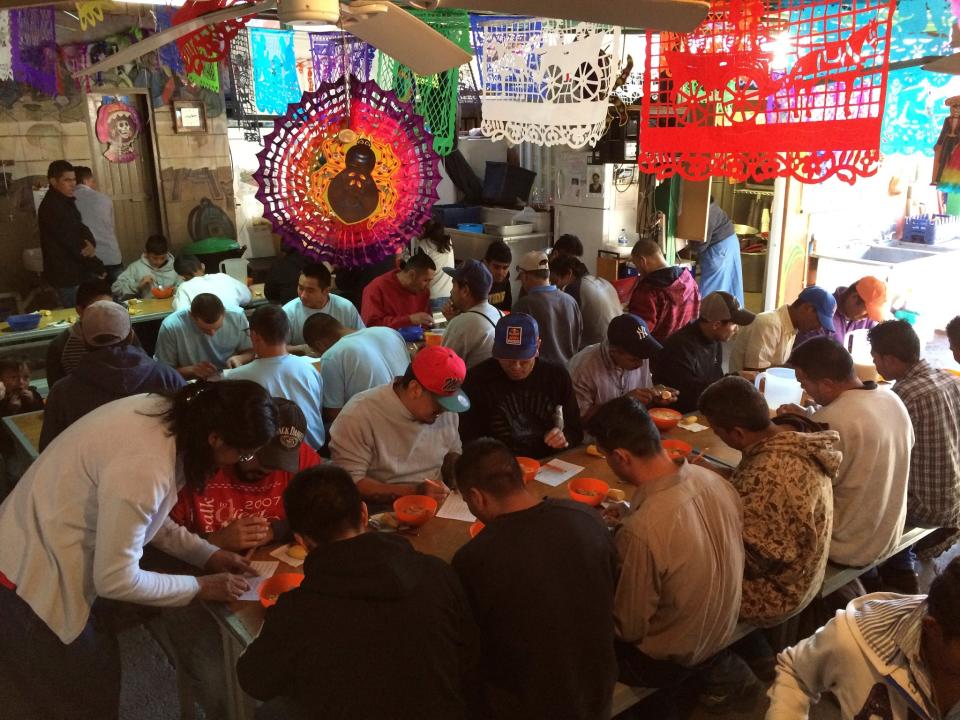
On Jan. 3, Quiroz met his new child and saw his oldest for the first time since he was arrested, via FaceTime.
“It was emotion that you don’t have words to explain,” he said, sifting through printed screenshots of the virtual encounter. “I was so, so, so relieved that they’re OK, they’re with people who are taking care of them. I don’t know if they’re good or bad, but they seem happy and that’s what matters.”
But Quiroz is not satisfied, and with each passing day grows increasingly frustrated with the system, worrying about the bond his kids are developing with their foster parents and how they’ll adjust to going from a two-parent household to living with their single father.
“I’m worried about that part of mom,” he said. “What am I going to tell them? What am I going to do to fill that hole?”
Though Quiroz said he’s become relatively comfortable in Nogales, he plans to leave here as soon as he is reunited with his children, probably to Canada. Anywhere he can be with his children, find a job to support them, and ideally, own his own business again without having to fear for his family’s safety, is where he wants to be.
“I don’t consider myself American or Mexican now,” he said. “I consider myself human.”
_____
Jose Lunez
“I was born here, in Nogales,” says Jose Lunez, pronouncing the city’s name with an Anglicized accent (“No-GAL-us”). “But I never knew life here until six years ago.”
Brought to the U.S. by his parents as a baby, Lunez, now 33, recalls aspects of his Tucson upbringing that sound typically American. He hung out with friends he met in elementary school all the way through high school. He followed the University of Arizona sports teams. He graduated from high school and entered the workforce, most recently making circuit boards and power cords “for a good company.” He’d become a father.
“I looked forward to having a good job, starting my family,” he said. “Like everybody else in the U.S.”
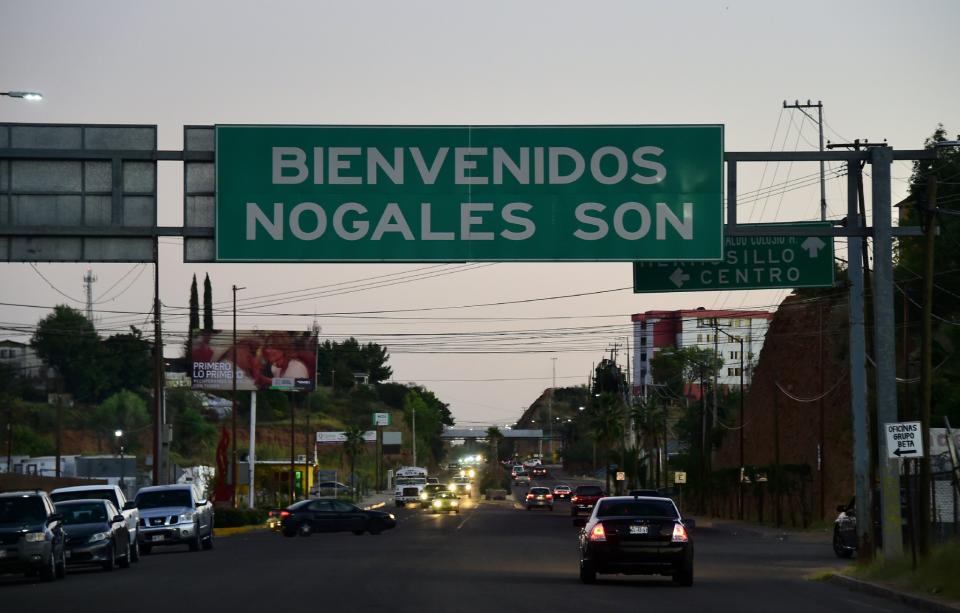
Growing up, Lunez knew he was different from other Mexican-American friends, who could cross back and forth between Nogales and Tucson without a problem, but he didn’t care.
“I felt like that’s where I belonged,” he said, referring to the United States. “That’s who I was. I was entitled to everything that any normal U.S. citizen was entitled to.”
Eventually, as an adult, Lunez decided to make it official and file for citizenship. He says he was midway through the process of getting his green card when, like many human beings American or otherwise, he did something stupid.
“I got in trouble for a DUI and got kicked out,” he said. Suddenly, he was dropped back in the city he’d been taken from “before I can even remember.”
Six years later, Lunez remains in a continuous state of culture shock.
“Ever since I can remember, I’ve been accustomed to the American way of life,” he said. Mexico may be the place where he was born, but as far as Lunez is concerned, “It’s a whole different world.”
In addition to the unrelenting pain of being separated from his family, Lunez said many of his early days, especially, in Nogales were spent longing for basic necessities he previously took for granted, like air conditioning, heat or a washing machine.

Not long after arriving in Nogales, Lunez found a job making bread at a grocery store bakery. It was after he received his first paycheck, however, that Lunez said the reality of his situation finally started to sink in.
“I walked into a clothing store, bought myself a pair of jeans and a nice T-shirt, and I walked out with only enough money in my pocket for lunch the next day,” he said. “That’s when it really hit home like, I’m not in a good place.”
Realizing that he could barely provide for himself, let alone his three children back in the U.S., “I think that’s the hardest part,” he said, choking back tears.
Lunez has had a variety of jobs since then, but one of his most positive experiences in Nogales thus far has been the two years spent working at a call center owned by RDI, a Cincinnati-based outsourcing company that provides translation, sales and marketing services for a number of large, American corporations like General Electric, HSBC, DirectTV, Groupon and Discover.
“I loved the call center,” Lunez said. “It gave me the chance to interact with people in my situation every day, and not feel that they looked at you funny because you speak English, or because your family is in the U.S.”
“It’s like a whole different little world in there,” he said, recalling his days at the call center, translating conversations over the phone between people across the United States.
“For those eight hours, I was out there in North Carolina, I was out there in Michigan,” he said. “It was great. It made you feel like you were basically in the U.S.”
Off the phone, the call center provided Lunez with a community of co-workers who would get together on the weekends and have work parties. Over time, however, Lunez said most of the co-workers eventually returned to the U.S. — some legally, others not.
In fact, he estimated that about “90 percent of the people I’ve met here in my situation are already back,” in the United States. “I’m one of the people that has been here the longest.”
No longer bolstered by the call center community, nor the network of lifelong friends he’d built in Tucson, Lunez said he hardly interacts with anyone in Nogales these days. “I just work, go home, that’s it,” he said.
Social media allows him to keep up with his family, but watching as their lives go on without him can be painful.
“Every weekend they all get together, dinner all that, and the only one not there is this guy right here,” he said. “That’s rough.”
So far, the very real risk of jail time has kept Lunez from attempting to cross the border himself, but he’s not sure how much longer he’ll be able to last in this limbo.
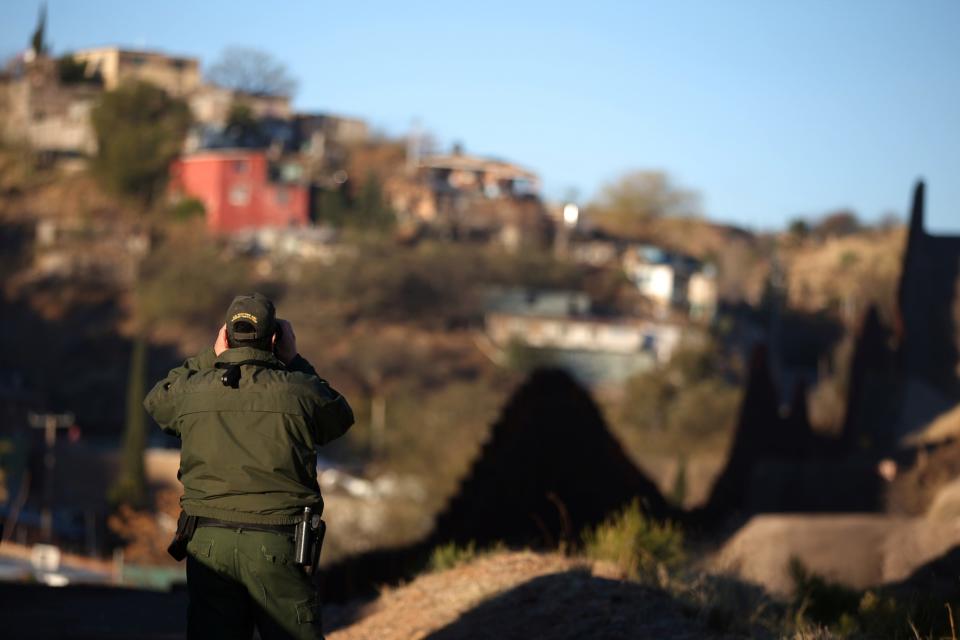
“I’m not going to be here forever,” he insisted, adding, “I would like to do it the right way but it’s hard… especially here when you’re struggling just to make ends meet.”
Just a few days ago, Lunez reached a breaking point after he witnessed a cartel-related shooting outside his house mere moments after returning home from work.
“It freaked me out so bad that I covered my window with a piece of Sheetrock and turned off all my lights and just laid in bed,” he said. “I never, ever experienced that in the U.S., and the thing is, I didn’t have nobody to call. That’s when I realized, man I really need to get back.”
Even after six years in Mexico, he said, “I can’t assimilate to the culture.”
“It all comes down to your thoughts, when you’re alone [how] you think to yourself in your head,” he said. Even though Spanish is his first language, “All my thoughts, everything in my head is in English. Nothing is in Spanish, nothing.”
The language skills that qualified Lunez to work at the call center are also vital to his current job at one of the pharmacies near the port of entry to the U.S., where Americans pour in from Arizona every day for discount prescriptions, dental services and other, more illicit, goods. There, he continues to seek even brief connections to his past life.
“I see somebody walk by with an Arizona Wildcats T-shirt, and I feel proud of it,” he said. “That’s my team, that’s where I’m from.” Sometimes he even runs into people he knows from back home. “I [feel] like grabbing onto them and just,” he said, reaching out to an invisible friend. “Take me with you.”
Perhaps the most painful part of Lunez’s life in purgatory is the knowledge that he’s no longer welcome in the only place he’s ever called home.
“It’s like, what was it about my life, or what was it about me that got me to a point where I’m not allowed in there anymore?” he asked. “I don’t think anybody deserves something like this, no matter what happened. To be thrown into another world… it’s cruel, it’s bad, it’s something that scars you.”
_____
Edwin Espinoza
When Edwin Espinoza first entered the United States from Mexico in 1978, it was through a “big old hole” in the fence just around the block from the pharmacy where he now works in Nogales.
A native of Guatemala, Espinoza ran away to Mexico with two friends when he was just 10.
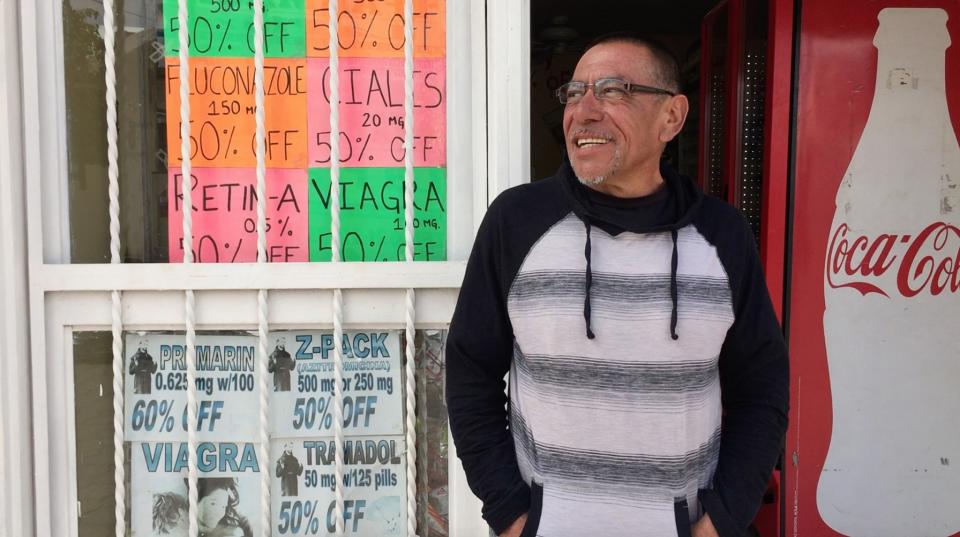
“I thought Mexico was a great big country and a rich country,” he told Yahoo News. “I said, ‘I’m gonna make it there.’”
One day in Tuxtla Gutierrez, the capital of Mexico’s southern Chiapas state, the young Espinoza was picked up by a truck driver who offered to adopt him. “That’s how I got the Mexican citizenship,” he explains.
For the next seven years or so, Espinoza went back and forth between Mexico City and Guatemala, going to school and working odd jobs, until he decided to continue his journey north at age 17. His first stop was Phoenix, where he already had some friends. He spent the next couple of years moving around from Los Angeles to Boston before returning to Phoenix in 1983.
“I feel like my hometown is Phoenix,” said Espinoza. “I grew up there… That’s why I came back from Boston, I love Phoenix.”
But 35 years after he first arrived in the city he loves, Espinoza was deported following a messy traffic stop in Scottsdale. As he tells it, “I went to a store to pick up some beer and I forgot to turn on my lights.” When he was pulled over, he had an open can of beer — and no driver’s license. Soon Espinoza was back in his adopted country, on the other side of the sheet metal fence that has since replaced the hole he once climbed through as a teenager.
“When I got deported I lost everything except my family,” said Espinoza, now 56. “It’s bad, really. It destroyed my life.”
Still, Espinoza said he’s lucky to have been deported to Nogales, where the omnipresent Sinaloa cartel keeps a lower profile than in other border towns.
In Ciudad Juarez or Tamaulipas, he said, “you see the stores closed, abandoned houses, because they charge you for living, or if you got business you have to pay them.” he said. “Not here. If you don’t get involved with them, they got no problem.”

“They don’t want Americans to get hurt,” he said, glancing up toward hills where puntos, or cartel lookouts, are known to keep a constant watchful eye on all activity in town. “If they see us bothering the tourists, it’s not going to be a police who come to get you, it’s gonna be them.”
Before he got deported, Espinoza said he was making around $60,000 or $70,000 a year with his own scrap metal recycling business. Now, he takes home $120 on a good day at the pharmacy in Nogales.
“They cut my wings,” he said. But more than just the economic and material losses incurred with deportation, Espinoza said, “they separate me from my kids, my grandkids, the people that I love. It’s like they take part of me.”
In his younger days, Espinoza might have tried to cross again, but now he said the possible jail time he faces if he gets caught isn’t worth the risk. Instead, his three U.S. citizen children, ages 30, 28 and 26, and their kids make the three-hour drive from Phoenix to visit him every three months or so. His girlfriend comes every other week.
Though he hates to be away from his family, Espinoza said he’s grateful that his kids are already grown and can work and support themselves.
“That’s satisfying, that I did my job,” he said. “I believe that they are great citizens and I’m proud of them.”
As for him, Espinoza will simply have to channel the same resilience and work ethic that drove him to leave Guatemala for greener pastures at age 10.
“I have to stay here, I have to make life here,” he said. Nodding toward the border fence just yards away, he added: “But if I can make it over there, I can make it over here.”
_____
Read more from Yahoo News:



